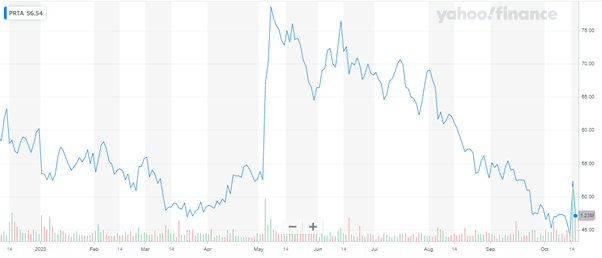Prothena Corporation plc (NASDAQ:PRTA) is currently one of the hottest biotech companies on Wall Street and has set the financial world abuzz. The catalyst? A tantalizing report suggesting that Prothena might be contemplating strategic alternatives including a potential sale (possibly to a pharma major?) that could forever change the game in the battle against Alzheimer’s disease. As the tension builds and Prothena’s pivotal data release draws near, investors are left to ponder whether this could be their golden ticket in the dynamic world of biotech investments, especially now, given the rumors of a potential acquisition. The company is said to be in discussions with advisors, contemplating the merits of exploring these strategic alternatives, setting the stage for a pivotal decision. Let us have a closer look at Prothena’s operations and evaluate its merits as a potential acquisition target.
What Does Prothena Do?
Prothena Corporation plc, a late-stage clinical company headquartered in Dublin, Ireland, is dedicated to pioneering innovative therapies for diseases stemming from protein dysregulation, primarily operating in the United States. The company’s ambitious portfolio includes Birtamimab, a humanized antibody currently in a Phase III clinical trial for AL amyloidosis treatment; Prasinezumab, a humanized monoclonal antibody undergoing a Phase IIb clinical trial targeting Parkinson’s disease and related synucleinopathies; NNC6019, which has successfully completed a Phase I clinical trial and is aimed at treating ATTR amyloidosis; and PRX005, currently in Phase I clinical trials as a potential solution for Alzheimer’s disease. Prothena’s research initiatives also encompass PRX012 for Alzheimer’s disease treatment, PRX123, a dual Aß-Tau vaccine designed for Alzheimer’s treatment and prevention, as well as TDP-43 and PRX019 for managing Alzheimer’s disease and other neurodegenerative conditions. The company has strategic partnerships, including a licensing, development, and commercialization agreement with F. Hoffmann-La Roche Ltd. and Hoffmann-La Roche Inc. for alpha-synuclein-targeting antibodies like prasinezumab, and a collaborative agreement with Bristol-Myers Squibb for antibody development. Founded in 2012, Prothena Corporation plc is at the forefront of groundbreaking research, offering hope for improved treatments and potential breakthroughs in the field of protein dysregulation-related diseases.
Diverse Portfolio & Clinical Advancements
Prothena’s diverse portfolio with a mix of both wholly owned and partnered programs stands as a pivotal driver for the company in the coming years. With four wholly owned programs and five partnered programs, the company maximizes the potential of its assets while maintaining full upside potential for its proprietary therapies. Notably, the advancement of Alzheimer’s programs like PRX012 and PRX005 into clinical trials is a significant milestone. As these programs progress, Prothena’s stock value may see substantial fluctuations based on the outcomes of these trials.
Robust Alzheimer’s Disease Portfolio
Alzheimer’s, a debilitating neurodegenerative disorder, has long confounded scientists and pharmaceutical companies alike. However, the prospect of a groundbreaking treatment has become increasingly tangible, with Prothena’s recent leap forward. As the Silicon Valley-based biotech behemoth edges closer to unveiling key data regarding its Alzheimer’s treatment, the entire investment community is on high alert.
Prothena’s robust portfolio of Alzheimer’s disease treatments presents a major factor that could result in its acquisition. With programs such as PRX012, PRX005, and PRX123 targeting different aspects of the disease, including A-beta plaque clearance, MTBR-tau, and combination strategies, Prothena aims to revolutionize the Alzheimer’s treatment landscape. Notably, the accelerated approval of lecanemab, an anti-A-beta antibody, has opened new possibilities in Alzheimer’s treatment, positioning PRX012 as a potential next-generation subcutaneous treatment for Alzheimer’s. If these programs continue to show promise, it could significantly impact the stock’s performance.
Prothena’s allure lies in the promise of its Alzheimer’s treatment, with the biotech expected to release crucial data later this year. If the stars align and the treatment proves as effective as anticipated, it’s believed that Prothena could attract the interest of industry giants.
Strategic Partnerships & Capital Position
Prothena’s strategic partnerships with pharma giants such as Novo Nordisk, Bristol Myers Squibb, and Roche. Each of these companies could become potential acquirers. These partnerships, along with its strong capital position, offer stability and growth potential for the company’s pipeline. The $40 million received from Novo Nordisk and the net proceeds of $172.4 million from a follow-on offering enhance the company’s financial strength. Prothena’s capital structure remains debt-free, ensuring financial flexibility. These partnerships and financial stability could drive investor confidence and contribute to the stock’s performance in the foreseeable future.
Final Thoughts

Source: Yahoo Finance
We can see a visible spike of close to 13% surge in Prothena’s stock price after the announcement of the company’s management evaluating strategic alternatives including a potential sale. Prothena has a lot of merits in its profile that could make it an attractive acquisition target for large pharma – a diverse portfolio and major clinical advancements, a robust Alzheimer’s disease portfolio, and of course, a series of strategic partnerships with industry giants. Even if the company does not get acquired, these factors are expected to play a crucial role in shaping Prothena’s stock trajectory in the coming years. Investors will closely monitor the progress and outcomes of clinical trials, as well as the company’s ability to leverage its partnerships to address unmet medical needs in the field of protein dysregulation diseases. Overall, we believe that there is a good chance that Prothena may get acquired soon and we see the company as a decent event-based opportunity for investors with a high risk appetite.

